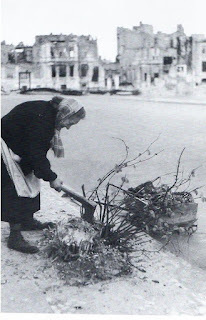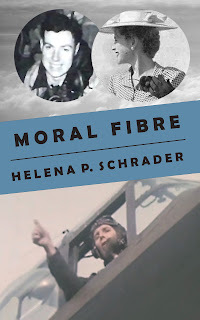Dissecting "Cold Peace" Part X - The Setting and Description
Writers of historical fiction have a particular obligation to "set the scene" of their work. By definition, the environment of a historical novel is unfamiliar to most readers. It must be described -- without the description dominating or blotting out the characters and action -- if the reader is to be absorbed into the milieu and atmosphere of the era in which the novel takes place.
Unless writing about someplace exotic, writers of fiction set in the contemporary world have the huge of advantage of being able to use "short hand" when setting a scene. Readers can be expected to know what a Starbucks or MacDonalds is and what food is offered in each. They know what an "SUV"or "Mercedes" looks like. They know how mobile phones work.
The readers of historical fiction, however, don't necessarily know what food might be available in a 18th century tavern, a medieval monastery, or a wartime "British Restaurant." They won't know what it was like to travel by horse or understand the technology behind a three-rigged sailing ship. It is unlikely that they have relied on letters for communication or had to use telephones that work through a switchboard.
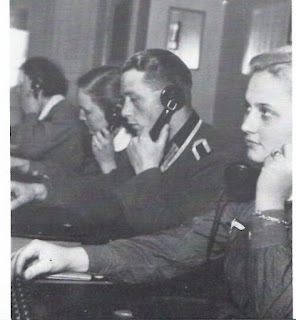
Writers of books set in the last century have an added problem. While readers of books set in Ancient Rome, the Crusades or the American Civil War, however, are generally conscious that significant changes that have taken place in the intervening centuries, the differences between the modern world and the mid-twentieth century are more subtle. While these can easily be overlooked, failure to take them into account and flag them to the reader can detract from the authenticity. A simple example is that in an age where everyone carries a phone around with them, it is sometimes hard to remember that almost no one had a telephone in Berlin in 1948. Yet that simple fact has a direct impact on the plot of a novel set in this era because it means characters could rarely communicate in real time unless face-to-face.
An author of historical fiction has the duty to not only ensure the action of the novel is possible within the technological and social constraints of the period, but also help the reader see the differences between the past and present. For example, to describe a character placing a call from a public box and using coins or having such a call cut off when the money is used up helps remind the reader that the book is taking place in a different world than his/her own.
Likewise, in place of meticulous descriptions that slow down the flow of the novel, the occasional reference to specific features which evoke the period can be woven into the action of the novel. In Cold Peace this included passing reference to things like the propellers of the aircraft, posters of Stalin, "Red Shoes" playing at the cinema and jazz or 'big band' music on the radio.
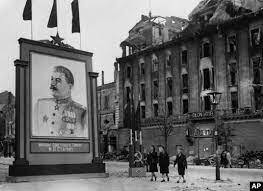
Yet there are also times when a scene-setting description is justified. Berlin in 1948 was so very different from anything most modern readers can imagine. (Those living in Gaza or eastern Ukrainie are the exceptions) The extent of the destruction required a more comprehensive description. E.g.
Gritting her teeth togetherunconsciously, [Charlotte] left the wide thoroughfare. There were nostreetlights, and no light came from the houses either. Almost all thebuildings here, if not completely destroyed, had lost their roof to fire. Theupper floors of many were gutted. Yet, most were still inhabited on the groundfloor and some on the first and second floors as well. Behind façades shorn ofplaster, people existed more than lived. They cooked a little food over awood-burning stove, crowded around a radio, perhaps, or read by the light of abulb dangling from the ceiling. No light escaped onto the street because therewas no glass to replace the shattered windows. Instead, the windows wereboarded up with plywood and cardboard or closed with heavy curtains. Yettrickles of smoke and the smell of cooked onions, carrots and potatoes oozingout into the cold, motionless air betrayed the presence of humans hidden in theruins.
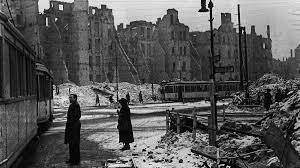
Likewise, descriptions may be necessary to explain the behavior of characters. For example:
[Emily] considered the gleaming mahogany dining tableat which she sat. It could comfortably seat twelve, and the place settings laidout for herself and Robin were made up with gold-trimmed, white porcelainflanked by heavy, silver cutlery. The matching neo-classical chairs standing atattention around the table had striped satin seats. Sliding glass doors openedonto a breakfast room at the far end, while the other three walls were hungwith pairs of portraits going back to the 18th century. Looking through thebreakfast room toward the lake, she could see swans waddling past the smallboathouse that crouched at the far side of an expansive lawn.
But something wasn’t right. Emily supposed shemight have felt uncomfortable in so much grandeur anywhere. Yet as she satsipping her cooling tea, she felt her skin creep. Everything here had beencarefully collected and lovingly displayed to create a harmonious composition.That was no accident. The Allies had imperiously tossed out the residents ofthe houses they requisitioned, which meant she was living in someoneelse’s house. She couldn’t help wondering who the real owners were. Aprofessor, perhaps, or an orchestra conductor? Or had it been a factory owner,happy to use slave labourers or even an SS officer?
While descriptions inevitably slow down the pace of a novel and if misplaced can shatter growing tension, destroy a sense of urgency or distract from a character's feelings, when sparingly used and strategically placed they enrich a novel. On the one hand, they help a reader "see" the novel providing color and other details that fill in the otherwise blank space surrounding the characters. On the other hand, they can contribute to the action of the novel by setting the mood for what follows.
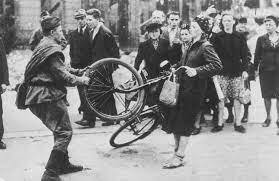
Cold Peace is Book I of the Bridge to Tomorrow Series.
Three years after WWII, Europe struggles with rationing, widespread unemployment and a growing Soviet threat. Hitler's former capital lies ruined under the joint control of wartime allies bitterly at odds. With the currency worthless, the population lives on hand-outs or turns to crime and prostitution. Deep inside the Soviet Zone of occupation, Berlin appears to be an ideal target for a communist take-over, putting the defenders of democracy on a collision course with Stalin's merciless aggression.
A Battle of Britain ace, a female air traffic controller, a concentration camp survivor and an ex-ATA woman pilot are just some of those trying to find their place in the post-war world. An air ambulance service offers a shimmer of hope, but when a Soviet fighter brings down a British passenger liner, Berlin becomes a flashpoint. The world stands poised on the brink of World War Three.
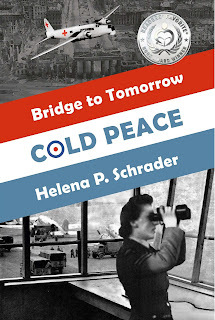
Find out more at: https://www.helenapschrader.com/bridg...
View a video teaser at: https://www.youtube.com/watch?v=JTuE7...
Previous releases include:
" MORAL FIBRE" WON THE HEMINGWAY AWARD 2022 FOR 20TH CENTURY WARTIME FICTION and a MAINCREST MEDIA AWARD FOR MILITARY FICTION as well as being A FINALIST FOR THE BOOK EXCELLENCE AWARD 2023 IN THE CATEGORY HISTORICAL FICTION.
Riding the icy, moonlit sky,they took the war to Hitler.
Their chances of survival were less than fifty percent.
Their average age was 21.
This is the story of just one bomber pilot, his crew and the woman he loved.
It is intended as a tribute to them all.
or Barnes and Noble.
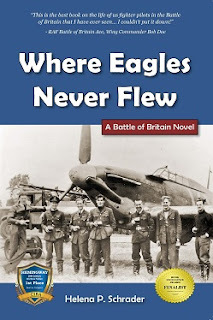 "This is the best book on the life of us fighter pilots in the Battle of Britain that I have ever seen.... I couldn't put it down."-- RAF Battle of Britain ace, Wing Commander Bob Doe.
"This is the best book on the life of us fighter pilots in the Battle of Britain that I have ever seen.... I couldn't put it down."-- RAF Battle of Britain ace, Wing Commander Bob Doe.
Winner of a Hemingway Award for 20th Century Wartime Fiction, a Maincrest Media Award for Military Fiction and Silver in the Global Book Awards.
Find out more at: https://crossseaspress.com/where-eagles-never-flew
For more information about all my books visit: https://www.helenapschrader.com
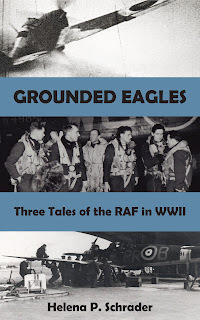 Disfiguring injuries, class prejudice and PTSD are the focus of three tales set in WWII by award-winning novelist Helena P. Schrader. Find out more at: https://crossseaspress.com/grounded-eagles
Disfiguring injuries, class prejudice and PTSD are the focus of three tales set in WWII by award-winning novelist Helena P. Schrader. Find out more at: https://crossseaspress.com/grounded-eagles

